Richard Dawkins quotations
about God and Religion
Richard Dawkins pictured in Melbourne, Australia in March, 2010, at a Global Atheist Convention:
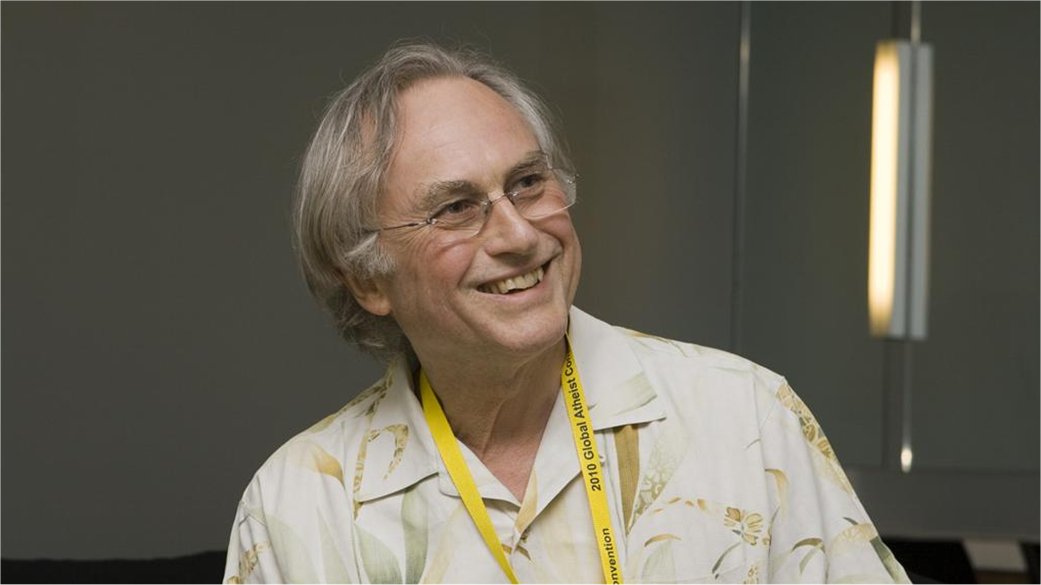
Early in 2014 the following image featured prominently, we must presume with his full consent, on Richard Dawkins' Twitter account page:
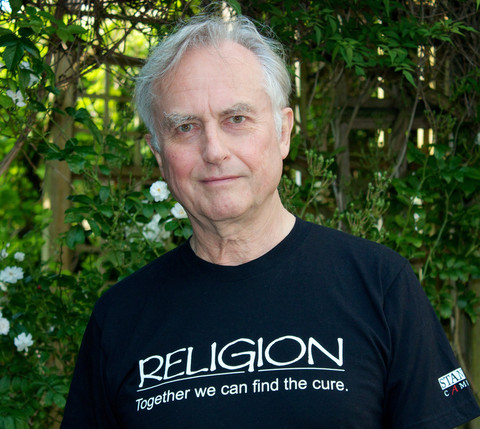
This page features some variously blatant, flagrant, unapologetic and headlong observations about - and criticisms of - God, religion, faiths and religious beliefs attributed to Richard Dawkins.
After a few of these quotations and quotes have been presented mention is made of a "Metaphysical-Philosophical" approach to the ongoing debate which could have potential to better
promote acceptance of Co-existence between Science and Religion.
Following on from this mention of things "Metaphysical-Philosophical" yet more observations about - and criticisms of - God, religion, faiths and religious beliefs attributed to Richard Dawkins are presented.
Following on from this mention of things "Metaphysical-Philosophical" yet more observations about - and criticisms of - God, religion, faiths and religious beliefs attributed to Richard Dawkins are presented.

It is fashionable to wax apocalyptic about the threat to humanity posed by the AIDS virus, "mad cow" disease, and many others, but I think a case can be made that faith is one of the world's great evils, comparable to the smallpox virus but harder to eradicate.
(From the opening line from a speech Richard Dawkins gave in 1996 to the American Humanist Association whilst accepting their "Humanist of the Year" award for 1996).

"The enlightenment is under threat. So is reason. So is truth. So is science... We have to devote a significant proportion of our time and resources to defending it from deliberate attack from organized ignorance..."
From an introductory page to the Richard Dawkins Foundation web site

"What has 'theology' ever said that is of the smallest use to anybody? When has 'theology' ever said anything that is demonstrably true and is not obvious? What makes you think that 'theology' is a subject at all?"

"Be thankful that you have a life, and forsake your vain and presumptuous desire for a second one."

"Everybody is an atheist in saying that there is a god - from Ra to Shiva - in which he does not believe. All that the serious and objective atheist does is to take the next step and to say that there is just one more god to disbelieve in."
Richard Dawkins

"We are all atheists about most of the gods that societies have ever believed in. Some of us just go one god further."

"I am against religion because it teaches us to be satisfied with not understanding the world."

"One of the things that is wrong with religion is that it teaches us to be satisfied with answers which are not really answers at all."
And now ~ some Metaphysics!
and Philosophy?
"…can we possibly refuse to admit that there exist in each
of us the same generic parts and characteristics as are found in
the state? For I presume the state has not received them from any
other source. It would be ridiculous to imagine that the presence
of the spirited element in cities is not to be traced to
individuals, wherever this character is imputed to the people, as
it is to the natives of Thrace, and Scythia, and generally
speaking, of the northern countries; or the love of knowledge,
which would be chiefly attributed to our own country; or the love
of riches, which people would especially connect with the
Phoenicians and the Egyptians."
Socrates / Plato ~ Famous Philosophers who lived in Ancient Greece
Socrates / Plato ~ Famous Philosophers who lived in Ancient Greece
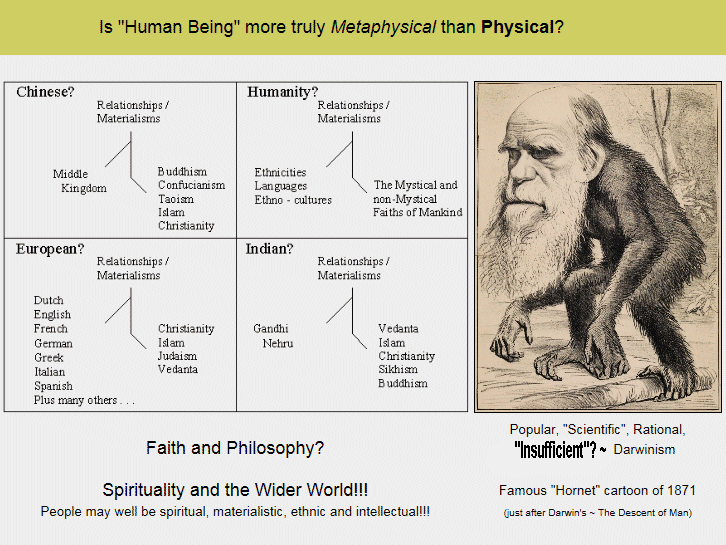
"The greatest obstacle to discovery is not ignorance - it is the illusion of knowledge."
Daniel J. Boorstin
Daniel J. Boorstin
Ralph Waldo Emerson
RALPH WALDO EMERSON (1803-1882) was, in his time, the leading voice of intellectual culture in the United States. He remains widely influential to this day through his essays, lectures, poems, and philosophical writings.
In the later eighteen-twenties Ralph Waldo Emerson read, and was very significantly influenced by, a work by a French philosopher named Victor Cousin.
A key section of Cousin's work reads as follows:
"What is the business of history? What is the stuff of which it is made? Who is the personage of history? Man : evidently man and human nature.
There are many different elements in history. What are they? Evidently again, the elements of human nature. History is therefore the development of humanity,
and of humanity only; for nothing else but humanity develops itself, for nothing else than humanity is free. …
… Moreover, when we have all the elements, I mean all the essential elements, their mutual relations do, as it were, discover themselves. We draw from the nature of these different elements, if not all their possible relations, at least their general and fundamental relations."
Introduction to the History of Philosophy (1829)
… Moreover, when we have all the elements, I mean all the essential elements, their mutual relations do, as it were, discover themselves. We draw from the nature of these different elements, if not all their possible relations, at least their general and fundamental relations."
Introduction to the History of Philosophy (1829)
Even before he had first read Cousin, (in 1829), Emerson had expressed views in his private Journals which suggest that he accepted that Human Nature, and Human Beings, tend to display three identifiable aspects and orientations:
Imagine hope to be removed from the human breast & see how Society will sink, how the strong bands of order & improvement will be relaxed & what a deathlike stillness would take the place of the restless energies that now move the world. The scholar will extinguish his midnight lamp, the merchant will furl his white sails & bid them seek the deep no more. The anxious patriot who stood out for his country to the last & devised in the last beleagured citadel, profound schemes for its deliverance and aggrandizement, will sheathe his sword and blot his fame. Remove hope, & the world becomes a blank and rottenness.
(Journal entry made between October and December, 1823)
In all districts of all lands, in all the classes of communities thousands of minds are intently occupied, the merchant in his compting house, the mechanist over his plans, the statesman at his map, his treaty, & his tariff, the scholar in the skilful history & eloquence of antiquity, each stung to the quick with the desire of exalting himself to a hasty & yet unfound height above the level of his peers. Each is absorbed in the prospect of good accruing to himself but each is no less contributing to the utmost of his ability to fix & adorn human civilization. (Journal entry of December, 1824)
Our neighbours are occupied with employments of infinite diversity. Some are intent on commercial speculations; some engage warmly in political contention; some are found all day long at their books … (This dates from January - February, 1828)
In all districts of all lands, in all the classes of communities thousands of minds are intently occupied, the merchant in his compting house, the mechanist over his plans, the statesman at his map, his treaty, & his tariff, the scholar in the skilful history & eloquence of antiquity, each stung to the quick with the desire of exalting himself to a hasty & yet unfound height above the level of his peers. Each is absorbed in the prospect of good accruing to himself but each is no less contributing to the utmost of his ability to fix & adorn human civilization. (Journal entry of December, 1824)
Our neighbours are occupied with employments of infinite diversity. Some are intent on commercial speculations; some engage warmly in political contention; some are found all day long at their books … (This dates from January - February, 1828)
The quotes from Emerson are reminiscent of a line from another "leading voice of intellectual culture" - William Shakespeare.
There's neither honesty, manhood, nor good fellowship in thee.
William Shakespeare: Henry IV (Pt 1), Act I, Scene II
William Shakespeare: Henry IV (Pt 1), Act I, Scene II
"The first glance at History convinces us that the actions of men proceed from their needs, their passions, their characters and talents; and impresses us with the belief that such needs, passions and interests are the sole spring of actions."
Georg Hegel, 1770-1831, German philosopher, The Philosophy of History (1837)
Plato, Socrates and Shakespeare endorse a Tripartite Soul view of Human Nature. Platos' Republic
Understanding the Past and Present. Why is the World the way it is today?
Understanding the Past and Present. Why is the World the way it is today?
"You will hear things like, "Science doesn't know everything." Well, of course science doesn't know everything. But,
because science doesn't know everything, it doesn't mean that science knows nothing. Science knows enough for us to
be watched by a few million people now on television, for these lights to be working, for quite extraordinary
miracles to have taken place in terms of the harnessing of the physical world and our dim approaches towards
understanding it. And as Wittgenstein quite rightly said, "When we understand every single secret of the universe,
there will still be left the eternal mystery of the human heart."
Stephen Fry quoting Wittgenstein during a Room 101 TV program
Stephen Fry quoting Wittgenstein during a Room 101 TV program
Vivekananda was an Indian Holy Man who made a much-appreciated appearance at the Parliament of World Religions which convened in Chicago in 1893.
In his work Religion and Science Vivekananda tells us that:-
Religion deals with the truths of the metaphysical world just as chemistry and the other natural sciences deal with the truths of the physical world. The book one
must read to learn chemistry is the book of nature. The book from which to learn religion is your own mind and heart. The sage is often ignorant of physical science,
because he reads the wrong book - the book within; and the scientist is too often ignorant of religion, because he too reads the wrong book - the book without.

The presentation of "Tripartite" Human Nature posited above could prove to be rather controversial.
Given this possibility a full consideration of all of this is given on our page which considers how Plato, Socrates and Shakespeare endorse a Tripartite Soul view of Human Nature, for the benefit of interested readers, but also to provide defensive argument against challenge from potential detractors!
Such defence would, undoubtedly, arise from the evidence on that page that not only, (and significantly), Plato / Socrates, Shakespeare and Emerson, (but also, and very significantly, several of the major World Religions), offer substantial implicit support to the presence of an already established, if largely unappreciated, recognition that an "Existential Tripartism" is present in all Human Beings.
Where this could, possibly, lead ...

N. B. The page mentioned in the graphic ~ roots.asp ~
has been replaced by this page
This 'knot of roots' insight features in:

Advaita Vedanta proposes a non-dualism wherein the individual spirit (Atman) is seen as being identical with ultimate reality (Brahman).
That which is nearest is least observed. The Atman is the nearest
of the near, therefore a careless and unsteady mind gets no clue
to the Atman. But one who is alert, calm, self-restrained, and
discriminating, ignores the external world and, diving more and
more into the inner world, realizes the glory of the Atman and becomes great.
Vivekananda
Stand upon the Atman, then only can we truly love the world. Take a very, very high stand; knowing our universal nature, we must look with perfect calmness upon all the panorama of the world.
Vivekananda
This is the secret of spiritual life: to think that I am the Atman and not the body, and that the whole of this universe with all its relations, with all its good and all its evil, is but as a series of paintings - scenes on a canvas - of which I am the witness.
Vivekananda ~ 'Vivekananada' is a 'Name-in-Religion' which translates as 'The Bliss of Discerning Wisdom'
Vivekananda
Stand upon the Atman, then only can we truly love the world. Take a very, very high stand; knowing our universal nature, we must look with perfect calmness upon all the panorama of the world.
Vivekananda
This is the secret of spiritual life: to think that I am the Atman and not the body, and that the whole of this universe with all its relations, with all its good and all its evil, is but as a series of paintings - scenes on a canvas - of which I am the witness.
Vivekananda ~ 'Vivekananada' is a 'Name-in-Religion' which translates as 'The Bliss of Discerning Wisdom'

"Religion is about turning untested belief into unshakable truth through the power of institutions and the passage of time."
Richard Dawkins

"The meme for blind faith secures its own perpetuation by the simple unconscious expedient of discouraging rational inquiry."

"The Bishop goes on to the human eye, asking rhetorically, and with the implication that there is no answer, 'How could an organ so complex evolve?' This is not an argument, it is simply an affirmation of incredulity."
Richard Dawkins (The Blind Watchmaker)

"Let children learn about different faiths, let them notice their incompatibility, and let them draw their own conclusions about the consequences of that incompatibility. As for whether they are "valid," let them make up their own minds when they are old enough to do so."
Richard Dawkins - The God Delusion

"The majority of children born into the world tend to inherit the beliefs of their parents, and that to me is one of the most regrettable facts of them all."
Richard Dawkins

"Many of us saw religion as harmless nonsense. Beliefs might lack all supporting evidence but, we thought, if people needed a crutch for consolation, where's the harm? September 11th changed all that."

"The human psyche has two great sicknesses: the urge to carry vendetta across generations, and the tendency to fasten group labels on people rather than see them as individuals. Abrahamic religion gives strong sanction to both - and mixes explosively with both. Only the willfully blind could fail to implicate the divisive force of religion in most, if not all, of the violent enmities in the world today. Without a doubt it is the prime aggravator of the Middle East. Those of us who have for years politely concealed our contempt for the dangerous collective delusion of religion need to stand up and speak out. Things are different now. All is changed, changed utterly."
Richard Dawkins

"My point is not that religion itself is the motivation for wars, murders and terrorist attacks, but that religion is the principal label, and the most dangerous one, by which a "they" as opposed to a "we" can be identified at all."
Richard Dawkins (A Devil's Chaplain: Reflections on Hope, Lies, Science, and Love)

"To be fair, much of the Bible is not systematically evil but just plain weird, as you would expect of a chaotically cobbled-together anthology of disjointed documents, composed, revised, translated, distorted and 'improved' by hundreds of anonymous authors, editors and copyists, unknown to us and mostly unknown to each other, spanning nine centuries"
Richard Dawkins (The God Delusion)

"Yahweh: "The God of the Old Testament is arguably the most unplesant character in all fiction: jealous and proud of it; a petty, unjust, unforgiving control-freak; a vindictive, bloodthirsty ethnic cleanser, a misogynistic, homophobic, racist, infanticidal, genocidal, filicidal, pestilential, megalomaniacal, sadomasochistic, capriciously malevolent bully."
Richard Dawkins (The God Delusion)

"God exists, if only in the form of a meme with high survival value, or infective power, in the environment provided by human culture."

"Faith is the great cop-out, the great excuse to evade the need to think and evaluate evidence. Faith is belief in spite of, even perhaps because of, the lack of evidence."

"It is often said, mainly by the 'no-contests', that although there is no positive evidence for the existence of God, nor is there evidence against his existence. So it is best to keep an open mind and be agnostic. At first sight that seems an unassailable position, at least in the weak sense of Pascal's wager. But on second thoughts it seems a cop-out, because the same could be said of Father Christmas and tooth fairies. There may be fairies at the bottom of the garden. There is no evidence for it, but you can't prove that there aren't any, so shouldn't we be agnostic with respect to fairies?"
Richard Dawkins (The God Delusion)

"...when two opposite points of view are expressed with equal intensity, the truth does not necessarily lie exactly halfway between them. It is possible for one side to be simply wrong."

Some Human Mysteries
"You will hear things like, "Science doesn't know everything." Well, of course science doesn't know everything. But,
because science doesn't know everything, it doesn't mean that science knows nothing. Science knows enough for us to
be watched by a few million people now on television, for these lights to be working, for quite extraordinary
miracles to have taken place in terms of the harnessing of the physical world and our dim approaches towards
understanding it. And as Wittgenstein quite rightly said, 'When we understand every single secret of the universe,
there will still be left the eternal mystery of the human heart.'"
Stephen Fry quoting Wittgenstein during a Room 101 TV program
Stephen Fry quoting Wittgenstein during a Room 101 TV program
It is widely known that Plato, pupil of and close friend to Socrates, accepted that Human Beings have a " Tripartite Soul " where the individual Human Psyche is composed of three aspects - Wisdom-Rationality, Spirited-Will and Appetite-Desire.
What is less widely appreciated is that such major World Faiths as Christianity, Islam, Hinduism, Buddhism and Sikhism see "Spirituality" as being relative to "Desire" and to "Wrath".
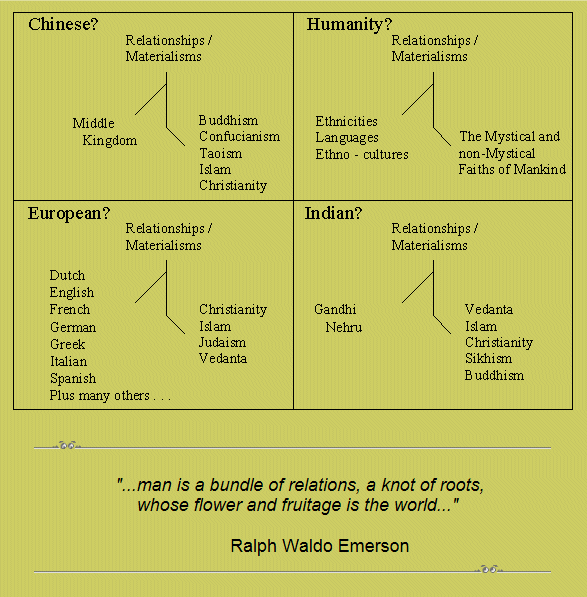
"bundles of relations and knots of roots"
tend to contribute towards giving rise to the "World" of Human Societies!!!
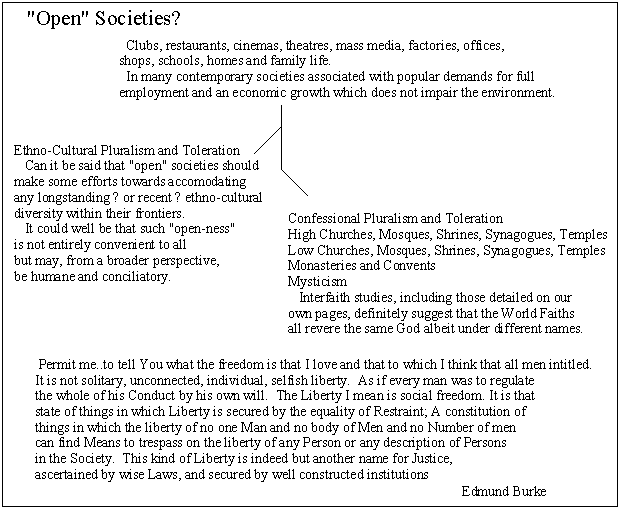
Although this may well depend on such things as:-
How "socio-politically doctrinaire" an individual society might be.
(Societies committed to Marxist ideology, for example, may not be particularly "Tripartite").
Is it credible that Societies could well be often founded on Human Nature???
"Mankind are so much the same, in all times and places, that history informs us of nothing new or strange in this particular. Its chief use is only to discover the constant
and universal principles of human nature."
David Hume
David Hume
"Whatever concept one may hold, from a metaphysical point of view, concerning the freedom of the will, certainly its appearances,
which are human actions, like every other natural event, are determined by universal laws. However obscure their causes, history,
which is concerned with narrating these appearances, permits us to hope that if we attend to the play of freedom of the human will
in the large, we may be able to discern a regular movement in it, and that what seems complex and chaotic in the single individual
may be seen from the standpoint of the human race as a whole to be a steady and progressive though slow evolution of its original endowment."
Immanuel Kant
Idea for a Universal History from a Cosmopolitan Point of View
Immanuel Kant
Idea for a Universal History from a Cosmopolitan Point of View
What is the business of history? What is the
stuff of which it is made? Who is the personage
of history? Man : evidently man and human
nature. There are many different elements in history. What are they?
Evidently again, the elements of human nature. History is therefore the
development of humanity, and of humanity only;
for nothing else but humanity developes itself, for
nothing else than humanity is free. ...
... Moreover, when we have all the elements, I mean all the essential elements, their mutual relations do, as it were, discover themselves. We draw from the nature of these different elements, if not all their possible relations, at least their general and fundamental relations.
Victor Cousin
Introduction to the History of Philosophy (1832)
Or to quote Emerson, from his famous Essay ~ History more fully:-
"In old Rome the public roads beginning at the Forum proceeded north, south, east, west, to the centre of every province of the empire, making each market-town of Persia, Spain, and Britain pervious to the soldiers of the capital: so out of the human heart go, as it were, highways to the heart of every object in nature, to reduce it under the dominion of man. A man is a bundle of relations, a knot of roots, whose flower and fruitage is the world. His faculties refer to natures out of him, and predict the world he is to inhabit, as the fins of the fish foreshow that water exists, or the wings of an eagle in the egg presuppose air. He cannot live without a world."
... Moreover, when we have all the elements, I mean all the essential elements, their mutual relations do, as it were, discover themselves. We draw from the nature of these different elements, if not all their possible relations, at least their general and fundamental relations.
Victor Cousin
Introduction to the History of Philosophy (1832)
Or to quote Emerson, from his famous Essay ~ History more fully:-
"In old Rome the public roads beginning at the Forum proceeded north, south, east, west, to the centre of every province of the empire, making each market-town of Persia, Spain, and Britain pervious to the soldiers of the capital: so out of the human heart go, as it were, highways to the heart of every object in nature, to reduce it under the dominion of man. A man is a bundle of relations, a knot of roots, whose flower and fruitage is the world. His faculties refer to natures out of him, and predict the world he is to inhabit, as the fins of the fish foreshow that water exists, or the wings of an eagle in the egg presuppose air. He cannot live without a world."
"There is one mind common to all individual men....
....Of the works of this mind history is the record. Man is explicable by nothing less than all his history. All the facts of history pre-exist as laws. Each law in turn is made by circumstances predominant. The creation of a thousand forests is in one acorn, and Egypt, Greece, Rome, Gaul, Britain, America, lie folded already in the first man. Epoch after epoch, camp, kingdom, empire, republic, democracy, are merely the application of this manifold spirit to the manifold world."
From Ralph Waldo Emerson's Essay ~ History
....Of the works of this mind history is the record. Man is explicable by nothing less than all his history. All the facts of history pre-exist as laws. Each law in turn is made by circumstances predominant. The creation of a thousand forests is in one acorn, and Egypt, Greece, Rome, Gaul, Britain, America, lie folded already in the first man. Epoch after epoch, camp, kingdom, empire, republic, democracy, are merely the application of this manifold spirit to the manifold world."
From Ralph Waldo Emerson's Essay ~ History
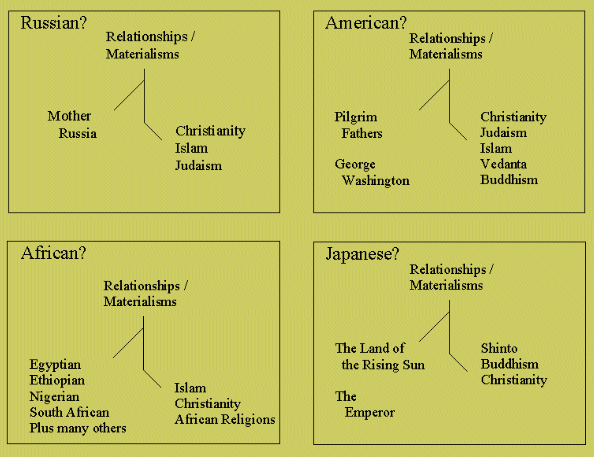
Key insights, from such formidably authoritative "Traditional" sources as the Great Faiths, Plato, Socrates, Pythagoras, Shakespeare and Emerson supportive of such a "Tripartite" view of Human Nature are available here at Age-of-the-Sage.
Believe it, or believe it not, Modern Psychological Science, also gives some support to such a "Tripartite" view of Human Nature!!!

We have prepared some fairly detailed, but hopefully entertaining, pages about a most informative
episode in European History in the spirit of attempting to learn worthwhile lessons of history about ~ The Human Condition!!!
